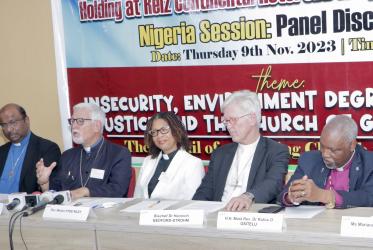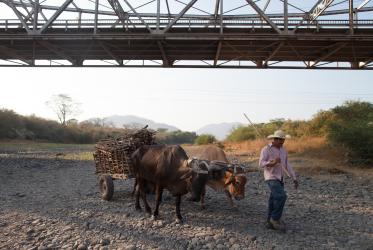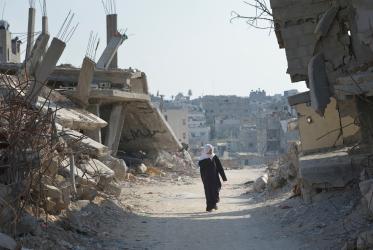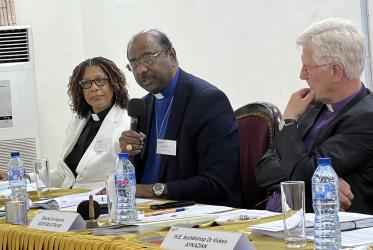EXECUTIVE COMMITTEE
Seoul, Korea,
August 24-27, 2004
We cry out to you from the depths of despair over the division of Korea,
which is the victim of a divided world.
You came to this world as the servant of peace,
You provided love and peace.
You commanded us to love each other.
We rejoice in your promises and recognise your blessings.
You have given us signs of hope in the midst of despair.
(Extract from World Day of Prayer - the Reunification of Korea)
The Korean Peninsula remains a flash point in the region. It has the potential to ignite a major conflagration. At the end of the Cold War a number of significant steps were taken to leave behind half a century of confrontation and hostilities. These, amongst others include the former President Kim Dae Jung's "Sunshine Policy" of engagement to improve inter-Korean relations that led to the historic inter-Korean summit and the 2000, 15th June Joint Declaration between North and South Korea; and the October 21st 1996, agreed framework between the United States and the Democratic People's Republic of Korea that provided a basis for dialogue to pave the way for a more broad-based approach to resolve conflict. These positive developments received a setback as a result of post-September 11 events that have had profound implications for security and stability throughout Northeast Asia. The US Administration's inclusion of North Korea (the DPRK) in an "axis of evil" further escalated tensions between the two countries making the situation in the Peninsula volatile. Since then, for some two years US and North Korea have been locked in showdown over the North's nuclear programme. North Korea became in 2003 the first country to withdraw from the Non-Proliferation Treaty (NPT).
The multilateral process of Six Party Talks, comprising North and South Korea, Russia, Japan, China and the US, that began in August 2003 in Beijing are now in the third round. This initiative provides sign of hope. The parties have agreed to work towards a nuclear-free Korean Peninsula and most share the view that North Korea's concern over its security must be given due consideration and resolved.
The churches in Korea, in close collaboration with the World Council of Churches, have played a pioneering role in initiating and supporting the discussions on peaceful reunification of the Korean Peninsula and its people. An effective framework for international ecumenical cooperation for this was put in place at an International Consultation at Tozanso, Japan in 1984. This framework provided an impetus to the reunification movement and was instrumental in bringing church leaders from North and South Korea together in prayer, worship and sharing of each other's concerns for peace and reconciliation.
In view of the historical role of the Korean churches in relation to the reunification issue, coupled with the August 2003 initiative of the Six Party Talks to find a peaceful resolution of the conflict, the CCIA Commission in its meeting of May 2004 decided to focus on peace and reunification of the Korean Peninsula till the next WCC Assembly at Porto Alegre in 2006.
The promotion and protection of human rights and human dignity are an integral part of the mission of the churches. The ecumenical movement continues to be concerned by reports of human rights violations in the DPRK and denial of access to international human rights organisations.
The grave humanitarian crisis of hunger, chronic malnutrition and related diseases facing the North Korean people are a challenge not only to the churches, but also to the conscience of the entire international community. The churches and their related agencies have addressed these immense needs of the people of North Korea to prevent the humanitarian crisis from becoming a major catastrophe.
Giving thanks to God for the persistent struggle of the Korean people and the witness of the Korean churches for peaceful reunification of the Peninsula and its people, the Executive Committee of the World Council of Churches meeting in Seoul, Korea, August 24-27 2004:
reaffirms the Policy Statement on the Peace and Reunification of Korea adopted by the Central Committee of the World Council of Churches, Moscow, 1989;
expresses once again its solidarity, with deep appreciation for the courageous witness and leadership of the National Council of Churches in Korea and its member churches;
reiterates its respect for the sovereignty of the Korean people to determine their future;
encourages and supports the implementation of the "Sunshine Policy" of engagement; the June 2000 Summit between North and South Korea to promote social, cultural and economic exchange programmes; the agreement between South and North Korea on non-aggression, reconciliation, exchange and cooperation of December 13, 1991; and facilitation of opportunities for family reunion involving greater number of Koreans;
calls on member churches in Korea as well as in other parts of the world to mobilise support for the Six Party Talks being held in Beijing in order to reach a formal peace treaty;
urges the government of North Korea to abandon all uranium enrichment and plutonium extraction programmes and move towards a fully verifiable return, to a status of non-nuclear state party to the NPT;
further urges the participants of the Six Party Talks to give due consideration to the DPRK's concern for its security in order to resolve this conflict, including assurances from the US not to take pre-emptive military action against the DPRK nor, under any circumstances, use nuclear weapons against the DPRK, as a non-nuclear party to the NPT;
appeals to the international community to call for lifting of sanctions against the DPRK and for full restoration of humanitarian aid and assistance including food to cope with the crisis of hunger and chronic malnutrition in the country;
requests the Government of the DPRK to ensure transparency in the distribution of aid and provide access to all affected areas;
asks the churches and the related agencies to continue their efforts to address the humanitarian needs of the people of North Korea.
EXECUTIVE COMMITTEE
Seoul, Korea,
August 24-27, 2004
We cry out to you from the depths of despair over the division of Korea,
which is the victim of a divided world.
You came to this world as the servant of peace,
You provided love and peace.
You commanded us to love each other.
We rejoice in your promises and recognise your blessings.
You have given us signs of hope in the midst of despair.
(Extract from World Day of Prayer - the Reunification of Korea)
The Korean Peninsula remains a flash point in the region. It has the potential to ignite a major conflagration. At the end of the Cold War a number of significant steps were taken to leave behind half a century of confrontation and hostilities. These, amongst others include the former President Kim Dae Jung's "Sunshine Policy" of engagement to improve inter-Korean relations that led to the historic inter-Korean summit and the 2000, 15th June Joint Declaration between North and South Korea; and the October 21st 1996, agreed framework between the United States and the Democratic People's Republic of Korea that provided a basis for dialogue to pave the way for a more broad-based approach to resolve conflict. These positive developments received a setback as a result of post-September 11 events that have had profound implications for security and stability throughout Northeast Asia. The US Administration's inclusion of North Korea (the DPRK) in an "axis of evil" further escalated tensions between the two countries making the situation in the Peninsula volatile. Since then, for some two years US and North Korea have been locked in showdown over the North's nuclear programme. North Korea became in 2003 the first country to withdraw from the Non-Proliferation Treaty (NPT).
The multilateral process of Six Party Talks, comprising North and South Korea, Russia, Japan, China and the US, that began in August 2003 in Beijing are now in the third round. This initiative provides sign of hope. The parties have agreed to work towards a nuclear-free Korean Peninsula and most share the view that North Korea's concern over its security must be given due consideration and resolved.
The churches in Korea, in close collaboration with the World Council of Churches, have played a pioneering role in initiating and supporting the discussions on peaceful reunification of the Korean Peninsula and its people. An effective framework for international ecumenical cooperation for this was put in place at an International Consultation at Tozanso, Japan in 1984. This framework provided an impetus to the reunification movement and was instrumental in bringing church leaders from North and South Korea together in prayer, worship and sharing of each other's concerns for peace and reconciliation.
In view of the historical role of the Korean churches in relation to the reunification issue, coupled with the August 2003 initiative of the Six Party Talks to find a peaceful resolution of the conflict, the CCIA Commission in its meeting of May 2004 decided to focus on peace and reunification of the Korean Peninsula till the next WCC Assembly at Porto Alegre in 2006.
The promotion and protection of human rights and human dignity are an integral part of the mission of the churches. The ecumenical movement continues to be concerned by reports of human rights violations in the DPRK and denial of access to international human rights organisations.
The grave humanitarian crisis of hunger, chronic malnutrition and related diseases facing the North Korean people are a challenge not only to the churches, but also to the conscience of the entire international community. The churches and their related agencies have addressed these immense needs of the people of North Korea to prevent the humanitarian crisis from becoming a major catastrophe.
Giving thanks to God for the persistent struggle of the Korean people and the witness of the Korean churches for peaceful reunification of the Peninsula and its people, the Executive Committee of the World Council of Churches meeting in Seoul, Korea, August 24-27 2004:
reaffirms the Policy Statement on the Peace and Reunification of Korea adopted by the Central Committee of the World Council of Churches, Moscow, 1989;
expresses once again its solidarity, with deep appreciation for the courageous witness and leadership of the National Council of Churches in Korea and its member churches;
reiterates its respect for the sovereignty of the Korean people to determine their future;
encourages and supports the implementation of the "Sunshine Policy" of engagement; the June 2000 Summit between North and South Korea to promote social, cultural and economic exchange programmes; the agreement between South and North Korea on non-aggression, reconciliation, exchange and cooperation of December 13, 1991; and facilitation of opportunities for family reunion involving greater number of Koreans;
calls on member churches in Korea as well as in other parts of the world to mobilise support for the Six Party Talks being held in Beijing in order to reach a formal peace treaty;
urges the government of North Korea to abandon all uranium enrichment and plutonium extraction programmes and move towards a fully verifiable return, to a status of non-nuclear state party to the NPT;
further urges the participants of the Six Party Talks to give due consideration to the DPRK's concern for its security in order to resolve this conflict, including assurances from the US not to take pre-emptive military action against the DPRK nor, under any circumstances, use nuclear weapons against the DPRK, as a non-nuclear party to the NPT;
appeals to the international community to call for lifting of sanctions against the DPRK and for full restoration of humanitarian aid and assistance including food to cope with the crisis of hunger and chronic malnutrition in the country;
requests the Government of the DPRK to ensure transparency in the distribution of aid and provide access to all affected areas;
asks the churches and the related agencies to continue their efforts to address the humanitarian needs of the people of North Korea.




